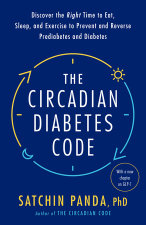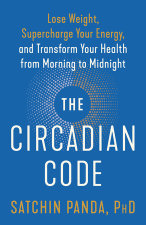Excerpt
From The Circadian Code

The Circadian Code by Satchin Panda, PhD
From the leading researcher in the field of circadian rhythm science comes a groundbreaking program that harnesses your body's circadian clock for weight loss and optimal health
Paperback
CHAPTER 1
We Are All Shift Workers
If you are a card-carrying shift worker who wakes up in the middle of the night to go to work, returns from work late at night, or stays awake all night, you know how it feels to be living against a primitive, primordial drive to sleep at night and stay awake during the day. But even if you’re not, I’m sure you can remember a time when you were fighting against your internal clock. The truth is, we are all shift workers. There are times in life when we go through chronic sleep disruption, and for many, those habits linger. If you pull an all-nighter at school or work, stay up late studying for a test, have a bad night’s sleep, travel across several time zones, stay awake late into the night to tend to a sick relative, or wake up a few times to feed and change a baby, then you too are a shift worker. A full-time job with long commutes combined with a regular home routine is like working two shifts and going to bed past midnight. Even one late night of partying can be just as disruptive as traveling from one time zone to another: That’s why we call it social jet lag.
The statement that “we are all shift workers” isn’t just an idea. Data points to this fact. For example, Professor Till Roenneberg, a researcher in Munich, surveyed more than 50,000 people in Europe and the United States and found that the majority of people either go to bed after midnight or wake up early with insufficient sleep. Similarly, people also follow different bedtime schedules on weekdays and weekends. At the 2017 World Sleep Congress, Roenneberg presented his data showing that roughly 87 percent of adults have social jet lag and go to bed at least 2 hours later on the weekend.
About 6 years ago, my lab started monitoring the activity and sleep patterns of close to 200 college students, and we found the same pattern that Roenneberg has reported. So far, there’s been only one person in the whole group who actually went to bed every day at the same time, within half an hour, including on weekends. There has been only one other student who went to bed before midnight for at least two days in a week.
We also monitor pregnant women and working moms with babies, and their patterns are also very erratic. In fact, their patterns are most similar to firefighters, who expect to be awoken a few times every night. For many women, the hardest part of motherhood is working against your clock to stay awake at night and trying to catch up on sleep at odd hours of the day. The only time new moms actually got good sleep, not surprisingly, was when they had some help beyond their spouse/partner, like in-laws or parents who could share some of the work at night.
Working mothers have the roughest time syncing their lives to a daily rhythm because their day is affected by everyone else in the home. Typically, working mothers wake up very early to get breakfast ready for the family, prepare the kids, pack the lunch bags and backpacks, get the kids to school or day care, and then get themselves to work. After dinner, they oversee homework, exercise, or work at home late into the night. As the week goes on, their circadian disruption becomes more severe. For instance, when my daughter was an infant, by Friday my wife would literally fall ill, and it would take her all weekend to recover.
No matter what the cause, we all know how it feels the day after a particularly rough night. You feel sleepy, yet you cannot sleep. Your stomach may feel upset, your muscles are weak, your mind is foggy, and you are certainly not in the mood to hit the gym. It’s as if your body and mind are confused--half of your brain may be telling you that it is time to catch up on lost sleep, but the other half is insisting that it’s daytime and you should not sleep. You may resolve to push on and reach for a strong cup of coffee or energy drink to stamp out the urge to sleep or try to get back into your regular routine as quickly as possible.
A brain on shift work cannot make rational decisions. According to a recent article in Popular Science magazine, a single night shift has cognitive effects that can last a week. These lapses in memory or attention can also make us vulnerable to bad habits. A few days of reduced sleep can change our appetite, both for the kinds of foods we crave and how much we want to eat when we stay awake at night. Often, we are prone to eat more calorie-dense junk food late at night when our stomach is meant to rest and repair.
Living in the shift-work zone can also cause difficulty in getting to sleep. Some turn to alcohol or sleeping pills, both of which can trigger depression. But more important, they are addictive remedies that create bad habits that continue even when our lifestyle does not demand us to be awake at night.
And if it weren’t bad enough that a shift-work lifestyle affects the way we feel the next day, our family members are in essence secondhand shift workers, as we may inadvertently disrupt their sleep as they wake up early or stay awake late to match our crazy schedules and keep us company. The effects on their health are equally troubling. For instance, in a 2013 analysis of published papers on the topic, researchers found that children of shift workers not only had more cognitive and behavioral problems as compared to children raised by non–shift workers, they also had a higher incidence of obesity.
While a day or two of staying awake late into the night, or a couple of days after traveling through a few time zones, may be uncomfortable, repeatedly disrupting your circadian clock can have adverse health consequences, as every system in your body starts to malfunction. It makes the immune system so weak that germs and bugs that don’t usually cause any trouble can upset your stomach or even cause flulike symptoms. It has been well documented that shift workers experience more health problems than non–shift workers, particularly gastrointestinal diseases, obesity, diabetes, and cardiovascular diseases. Surprisingly, the number one cause of death and work disability for active-duty firefighters is not fire or accident--it is heart disease, which is now thought to be linked to a disruption of the circadian rhythm. In many studies, shift work increases the risk for certain types of cancer to such an extent that, in 2007, the World Health Organization’s International Agency for Research on Cancer classified shift work as a potential carcinogen.
If we are all shift workers, then we will all suffer. This is why we have to understand how our circadian clock works, and how to optimize our lifestyle to nurture the natural rhythm of the body.
Copyright © 2018 by Satchin Panda, PhD
Satchin Panda, PhD, is a leading expert in the field of circadian rhythm research. He is a professor at the Salk Institute for Biological Studies and a founding executive member of the Center for Circadian Biology at the University of California, San Diego. Dr. Panda is a Pew Biomedical Scholar and a recipient of the Julie Martin Mid-Career Award in Aging Research. As a recognition of the impact of his work regarding circadian rhythms and diabetes, Dr. Panda has been invited to speak at conferences around the world, including Diabetes UK, the American Diabetes Association, the Danish Diabetes Association, and the respective professional diabetes societies of Europe and Australia.

